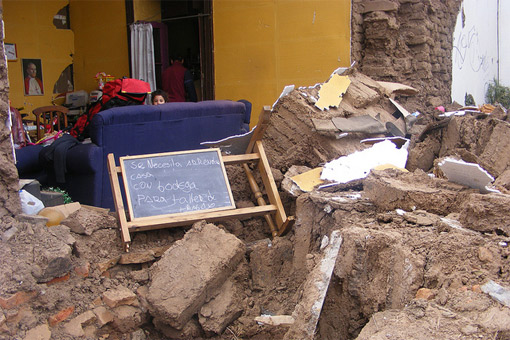On the morning of February 27, 2010, Interior Minister Patricio Rosende dismissed on national television “absolutely, the possibility of a tsunami,” asking the nation to remain calm only one hour after an 8.8-magnitude earthquake struck south-central Chile. Meanwhile, a series of waves were heading toward Chile’s shore. Eventually, the all-powerful water would engulf a 375 mile (600 kilometer) stretch of coastline from Concepción to Valparaiso and kill 525 Chileans.
Rosende’s statement, along with other actions (or inaction), would lead him and seven other government officials to stand trial some two years after the tragedy. Families of the victims are demanding justice. They seek criminal liability in what has surfaced as an undoubtedly bungled emergency response.
Currently facing charges at Séptimo Juzgado de Garantía de Santiago are Rosende along with the then-director of ONEMI (the Interior Ministry’s National Emergency Office) Carmen Fernández, former national chief of SHOA (the Navy’s Hydrographic and Oceanographic Service) Mariano Rojas and his lieutenant Mario Andinas, and four other government officials. The defendants stand trial for negligent homicide, which can carry a sentence of 61to 1,096 days imprisonment.
The accused continue to blame their counterparts for the failed alert. Increasingly, the trial points to a fragmentation of responsibility across different authorities. While it was in part Rosende’s responsibility to disseminate a tsunami alarm, it remains the primary argument of his defense lawyer, Samuel Donoso, that he could only act on information relayed to him by the entities such as SHOA and ONEMI.
For Rosende, the day began at ONEMI when he arrived and looked over a fax sent by the SHOA at 4:08 am—just 30 minutes after the earthquake had struck. It would later become evident that the purpose of the fax was to alert the office of imminent tsunami danger. But inconsistent protocol between the two bodies led to Rosende incorrectly interpreting the fax.
ONEMI had in place a two-phase warning system: “red alert” for imminent danger and a precautionary “yellow alert.” Rosende perceived the fax as a yellow alert message, and he proceeded to merely get ONEMI ready with available resources in case of disaster. This was not consistent with SHOA’s course of action, which had the responsibility to issue either a “tsunami alert” (the title of the fax sent to ONEMI) or “tsunami alarm”—both which would initiate an evacuation plan of coastal regions.
Less than one hour later (at 4:56 am), Carmen Fernández of ONEMI arrived at the office. She also reviewed the fax and discussed dissemination of a tsunami alert with Rosende. Once again, their choice was not to act on the warning. In court recently, her lawyer defended Fernández saying that she allegedly insisted they raise the alert but was rebuffed by Rosende who responded that “the navy has ruled out the risk.”
The assumption of no risk was made both due to misunderstanding the fax and to SHOA cancelling its original warning after the Navy misinterpreted satellite data. Up until cancellation of the alert, SHOA had acted properly by advising relevant authorities of the danger. But the cancellation—and ruling out of the risk—would help form a lethal combination of ill-fated decisions and contribute to the many lives lost.
Public Reaction
Professor Alfonso Campusano, director of the Center of Oceanographic Study at Universidad Andrés Bello, was on the Juan Fernández Islands—located 375 miles (600 kilometers) off the Chilean coast—when the first waves struck at around 4:25 am. Without receiving prior warning, Campusano led an impromptu evacuation of the area but, despite his quick thinking, the waves still managed to kill 16 people including one of his students.
He was immediately critical of the government’s actions that morning, openly stating that either ignorance and/or a lack of training directly resulted in the loss of lives. “The duty officer at SHOA was a typical naval officer having undergone only a short course in hydrography. SHOA Director Mariano Rojas was merely a navigator with no further knowledge on tsunamis. Mrs. Fernández is a journalist with no level of expertise on the subject, yet acted as she did with consequences we are all aware of.”
Campusano is not alone in his criticism of the former government, with many current political figures such as Interior Minister Rodrigo Hinzpeter pointing to a lack of leadership. “When you are part of a team and you simply say ‘to me that day was not my responsibility, there was nothing for me to do’, is perhaps not the way I think this situation should be handled,” Hinzpeter told Chile’s Radio Cooperativa.
All eight of the defendants have been prohibited from leaving the country until a verdict is reached, with it possible that further indictments will follow. Earlier last week video footage was released showing Raul Diaz, the former Chief of Police for Juan Fernández, speaking by telephone with then-President Michelle Bachelet between 6:00 am and 7:00am to inform her of the destruction on the island. Bachelet’s decision to not raise the alert, which allegedly could have saved further lives from being lost, has brought her under intense scrutiny as the secondary commission of investigation currently reviews the footage.
But the circle of blame continues in the courtroom. Fernández says that Rosende is at fault who, in turn, continues to blame the SHOA staff. What the investigation is revealing, however, is that such a grave loss of human life could have been avoided if a better emergency response strategy had been in place. It has brought to light a nation’s responsibility in having systems in place so that staff members are ready to act efficiently and cohesively in a state of emergency.
Future Preparedness
The courtroom drama has also brought to attention the nation’s ability to deal with future disasters of this magnitude. Benjamin Chacana, the current director of ONEMI says that President Sebastián Piñera’s administration has in place emergency response strategies much more efficient than those of two years ago. “We have strengthened all systems, preventative evacuation actually works automatically which is a significant advancement. We must not be alarmist, but we must find a compromise and we must be prepared for these disasters,” Chacana told Chile’s La Tercera.
If the current case has in fact resulted in a better early warning system then the public accusations and attention to previous mistakes will have resulted in positive changes for Chile. Disaster will strike again; Chile cannot afford a repeat of past mistakes.






